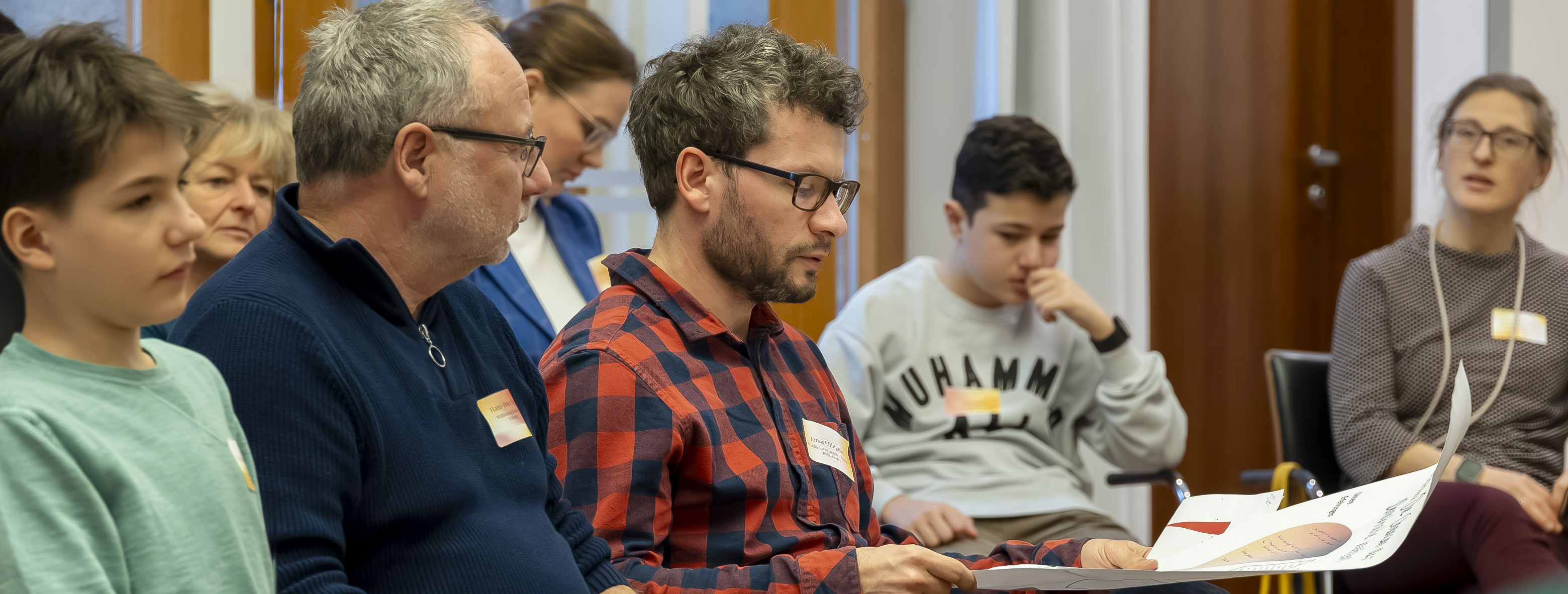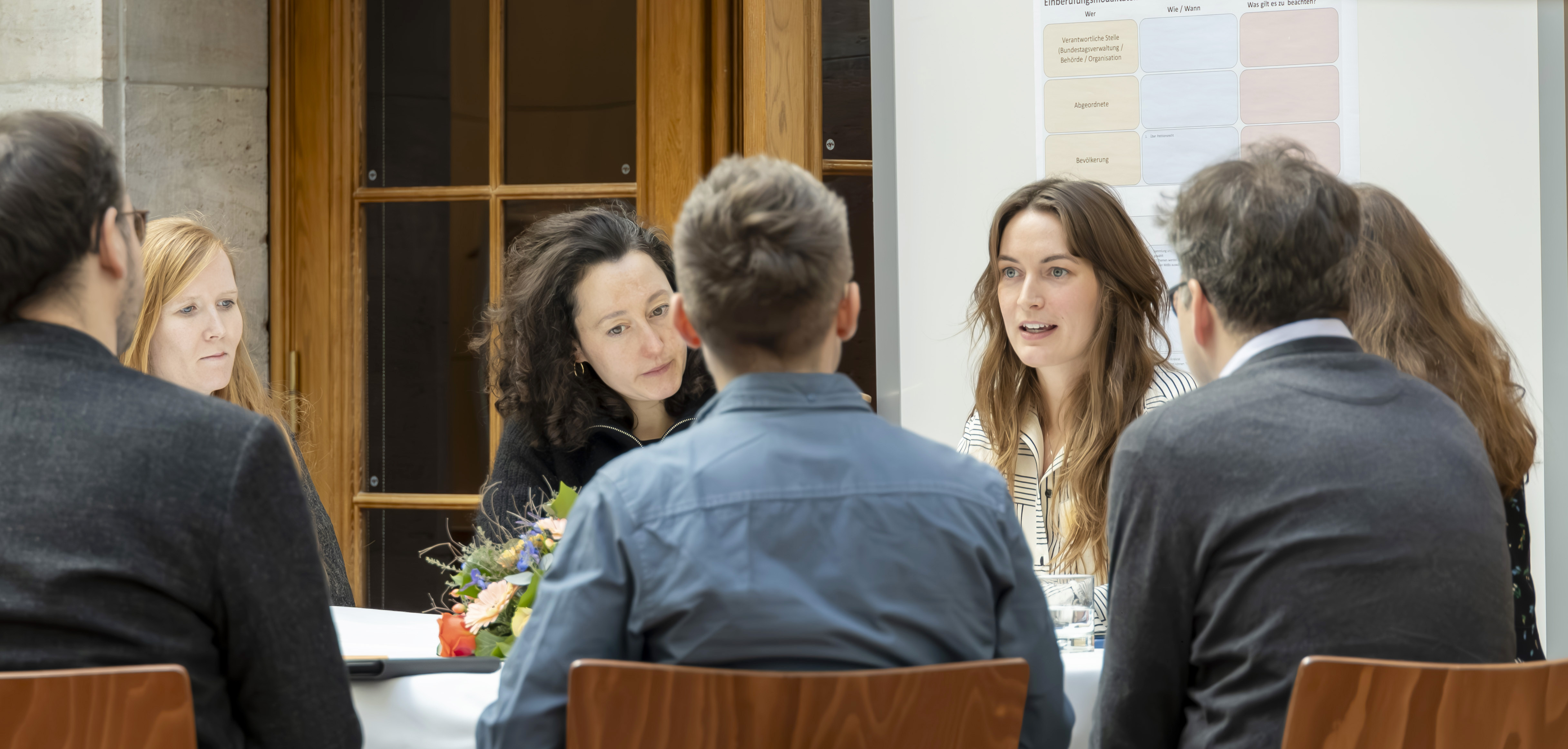External evaluation and research

Here are the results of the external evaluation
Read the complete evaluation report from Hallo Bundestag here and a shorter summary here. The evaluation was carried out by e-fect.
A research group at Humboldt University in Berlin also provided scientific support for the project. The preprint of their publication can be downloaded here, and we present the key findings further down on this page.

Result 1: Inclusive participation through diversity
The aim of involving people with different perspectives and backgrounds was achieved: The gender ratio was balanced and people of all age groups and people without German or European citizenship took part. People without or with a low level of education and people who do not (or no longer) work were also represented. In addition, people with low to high household incomes took part in the Electoral District Days – as did non-voters and people with little political interest. Only a subset of the survey participants were involved in voluntary work at the time before the Electoral District Day.
The diversity of the participants is also reflected in the perception of the participants: many emphasised the diversity of the opinions and perspectives represented.
Approaching the participants involved unique steps: there was (1) a personal visit, (2) meetings for the young people to get to know each other and (3) catering individual needs of the participants (e.g., language assistance). There are several indications that this approach contributed to greater diversity:
1) A high participation rate compared to other procedures.
2) 10 % of the participants only confirmed their attendance after being personally approached.
3) The most common reason for cancellation was a lack of time.
The approach worked particularly well with young people. As intended, younger people were proportionally overrepresented compared to the population. The response rate among young people was also significantly higher than among adults.

Result 2: Process quality
The participants surveyed assessed the moderation and dialogue during the Electoral District Days as highly positive: For the most part, they had the opportunity to make relevant contributions to the discussions and results of the event. From the perspective of the vast majority of respondents, the results of the Electoral District Days were not predetermined and represented concerns of the general public. The Electoral District Days offered the majority of participants individual gains in knowledge. For the vast majority, participation in the Electoral District Day was a positive self-efficacy experience.
The high process quality suggests that, for the vast majority of the participants surveyed, it was possible to engage in a deliberative exchange with each other.

Result 3: Impact - strengthening the motivation to participate in politics
The results of the before-and-after comparison clearly indicate that the Electoral District Days motivated participants to become more politically involved.
The intention to participate in politics by, e.g., partaking in another civic participation event, contacting politicians concerning a specific topic or engaging in an organisation targeting political, social or environmental issues, has increased. This effect is particularly evident among those who had previously been rather less involved in politics.
The before-and-after comparison shows a significant strengthening of participatory, collective and political efficacy and self-esteem beliefs. Participants who reported a low level of political interest and/or activity, showed a stronger increase in internal political efficacy and self-worth beliefs.
Qualitative results show that political interest has increased among some participants.
The motivating effect can also be seen in the active support of the outreach programme by individual participants and in the level of participation in the Electoral District Council meetings following the Electoral District Days. These meetings are to be continued independently by the participants beyond the end of the project.
Trust in political institutions is higher after participation than before. In particular, trust in politicians was strengthened. This effect can be well explained by the participation of (several) MBs in an Electoral District Day.

Result 4: Acceptance of the format by the participating Members of the Bundestag
For the MBs, the insights gained from the Electoral District Day, provided added value for their political work at a reasonable cost. Almost all of the MBs interviewed, were able to talk to people at the Electoral District Day with whom they would otherwise not come into contact and thus learn about new perspectives.
A large majority were more convinced of the format after their participation than before. The MBs and their staff believe that Electoral District Days should be held in all electoral districts in the future, and the majority of the MBs would use this format. According to the MBs surveyed, Electoral District Days can help to strengthen democracy.
These are the results of the scientific monitoring
We linked the project "Hallo Bundestag", which was conceived as an experiment, with academia and worked closely with the Department of Comparative Political Behavior at Humboldt University in Berlin. The preprint of their publication can be downloaded here.
Below, we present the key findings. These coincide with those from our evaluation, but reinforce them by comparing the responses of constituency day participants with those of an uninvolved control group.

Result 1: political trust
Compared to the control group in the study, participants in Electoral District Days showed a significant increase in political trust after attending, particularly in politicians. This effect was particularly strong when several parties were present at the Electoral District Day.

Result 2: political self-efficacy
Both the appreciative atmosphere at the Electoral District Day and the encounter with politicians who take them seriously lead to an increased sense of self-efficacy among the participants of the Electoral District Days. These effects are also significant in comparison to the control group.

Result 3: willingness to participate
Participation in Electoral District Day also appears to increase willingness to participate. This effect is significant in terms of willingness to contact politicians, engage in civil society, and participate in political discussions both online and offline.

Result 4: conspiracy narratives
The study also shows that engaging with other opinions and experiencing a transparent political process during Electoral District Days can reduce openness to conspiracy narratives. The effects were particularly significant when it came to questions about the manipulation of events and facts by elites.
Learn more ...
FAQ

Who contributes to the project?

Electoral District Day
